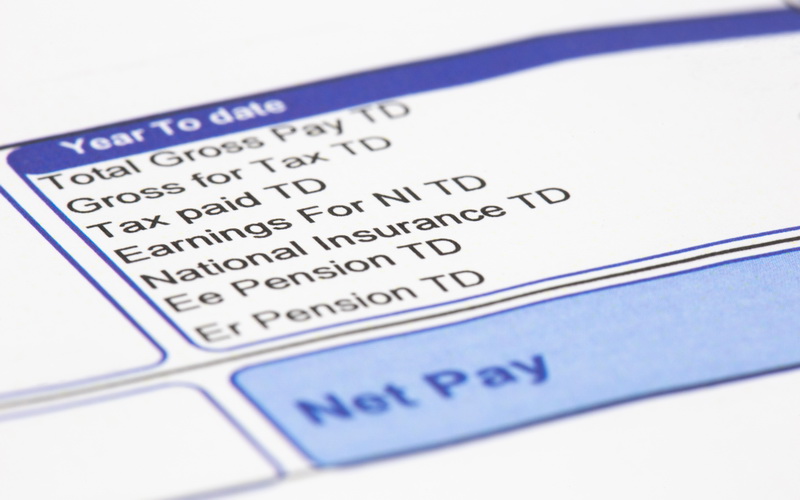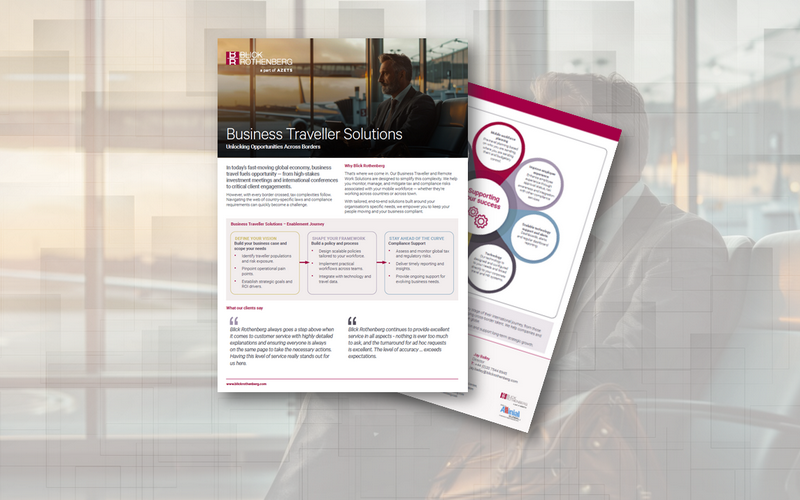Unlocking opportunities across borders

Global Mobility Services – Business Travellers
Unlocking opportunities across borders
Business Travellers
The number of employees working outside of their home country is soaring and this trend is set to continue. The UK is, and will remain, a key global destination for business travellers.
Whilst a highly flexible global workforce provides greater opportunities for international organisations to fulfil resourcing needs and quickly deploy talent globally to the areas that need it, this rapidly changing landscape also brings key challenges which need to be managed carefully and proactively.
The UK, like many tax authorities around the world, is seeking new ways to raise revenues and is more focused than ever on employers of business travellers. The regulatory environment is being tightened, and heavy penalties are being imposed for non-compliance.

What is a Short-Term Business Visitor?
If your overseas employees visit the UK for short work trip, they can trigger a PAYE (pay as you earn) reporting obligation, even if they are employed and paid by the overseas entity.
It is no longer as simple as saying that the employee is employed by the overseas entity and spending less than 183 days in the UK to remove these reporting obligations. Other factors are now also important, such as where the employment costs are borne and whether the employee is considered to have an integral role in the UK business.

When is UK tax due?
The UK has negotiated tax treaty agreements with most countries and therefore no UK tax is due provided the conditions stipulated in the treaty agreement are met.
Typically, the conditions to meet are:
- Employed and paid by an overseas entity
- Visiting the UK temporarily
- Not UK tax resident and visits do not exceed 183 days in any tax year or 12-month period
- No costs are cross charged to the UK, this will include salary and other management charges
Care should be taken where it is claimed that the visiting employee is not connected to the UK business or that costs are not borne here. A counter argument and risk might be that the overseas employee has therefore created a “permanent establishment” of the overseas company in the UK and therefore a corporate tax reporting obligation.
Employer reporting obligations
If the overseas employer does not have a UK presence and the overseas employee is under the control or working at a UK business, that UK business may be regarded as a “host employer”, even for short periods of time. HMRC now expect a host UK employer to either obtain a written Short-Term Business Visitor (STBV) agreement to avoid operating a UK payroll or take on the UK payroll obligations, even if they do not pay the employee. The change can apply to those on “formal” assignments or simply in the UK for extended business trips.
UK employers need to take steps to ensure that they have the relevant agreements in place with UK HMRC which remove the need to operate UK payroll and instead impose an annual reporting requirement on the UK business. This agreement is referred to as a “Short-Term Business Visitor Agreement”.
Where there is no STBV Agreement in place, Her Majesty’s Revenue & Customs (HMRC) have confirmed that they will no longer accept employer non-compliance. They require all UK businesses to perform UK payroll reporting for most International Business Travellers (IBTs), even if they continue to be employed and paid overseas.
| Scenario | Is it likely that IBT will be exempt from UK tax? |
| The employee spends less than 183 days in the UK. Costs (wages or local expenses) are not borne in the UK and the UK business is not regarded as the economic employer | Yes |
| The employee spends more than 183 days in the UK | No |
| Employee costs (either wages or local expenses) are borne in the UK | No |
| The UK company acts as the employer, directly or indirectly supervising the manner in which the services are performed by the employee | No |
| The services the employee provides constitute an integral part of the UK business | No |
| The employee visits the UK for less than 60 days. These visits do not form part of a more substantial period and the employee is not from an overseas branch of the UK company | Yes |
UK employer and employee social security taxes
National Insurance Contributions will not be due, provided the employee meets the conditions of a relevant Social Security agreement and the employer applies for a Certificate of Coverage/ A1.
UK social security tax will generally not be due where there is no Social Security agreement, provided the employee remains employed outside the UK and is here for less than 52 weeks.

Global solutions for business travellers
In today’s fast-moving global economy, business travel fuels opportunity — from high-stakes investment meetings and international conferences to critical client engagements.
However, with every border crossed, tax complexities follow. Navigating the web of country-specific laws and compliance requirements can quickly become a challenge.
That’s were we come in. Our Business Traveller and Remote Work Solutions are designed to simplify this complexity.
We help you monitor, manage, and mitigate tax and compliance risks associated with your mobile workforce — whether they’re working across countries or across town.
Enablement Journey
Define your vision – Build you business case and scope your needs
Identify traveller populations and risk exposure
Pinpoint operational pain points
Establish strategic goals and ROI drivers
Shape your framework – Build a policy and process
Design scalable policies tailored to your workforce
Implement practical workflows across teams
Integrate with technology and travel data
Stay ahead of the curve – Compliance Support
Assess and monitor global tax and regulatory risks
Deliver timely reporting and insights
Provide ongoing support for evolving business needs
Supporting your success – Services include
Mobile workforce planning
Pre-travel planning based on who you’re sending, where you’re sending them and budgetary control
Monitoring your mobile workforce location
Location analysis and tracking functionality to identify risks for compliance in tax, immigration and payroll
Improve employee experience
Enhance employee experience through approval status, risk awareness and integration with other compliance services
Support and global management
We will design, configure and implement your policy and process. In addition, we manage the program with you
Technology
Our technology is designed and configured to your needs and linked directly to your corporate travel and HR systems
Easy integration
Easy design, configuration and integration into your internal systems and links to corporate travel and relocation systems
Scalable technology Support and Alerts
Dashboards, alerts and regular dashboard reporting
You might be interested in

Business Traveller Solutions – Flyer

Short Term Business Travellers

Key Considerations for Short-Term Business Visitors
Our experts
Want to know more?
Transform your approach to global workforce management.
Contact us today to learn more about how we can support your needs and help you or your company thrive in the international arena.














